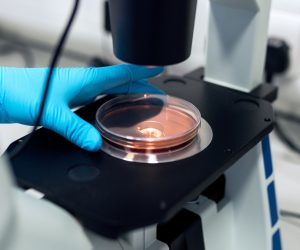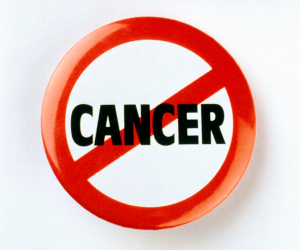Pomegranates Put to the Test for Prostate Cancer
Michael Greger M.D. FACLM via Nutrition Facts – The pomegranate “has been revered through the ages for its medicinal properties”—so much so that it’s been used as a symbol for some medical organizations. A fruit seems to me a better representation of health than the American Medical Association’s snake on a stick.
The pomegranate is thought to be beneficial for a wide range of diseases, including several types of cancer, cardiovascular disease, and rheumatoid arthritis. Evidently even the cannibals love it as it improves the color of “kid meat.” The researchers were talking about baby goats, but the title of their study did make me do a double-take! (Photo by Arjun Kapoor on Unsplash)
Most of the attention over the last decade has focused on pomegranates and prostate cancer. In vitro studies have shown that pomegranate extract can suppress the growth of prostate cancer cells in a petri dish by up to 95 percent. As you can see in my video Pomegranate vs. Placebo for Prostate Cancer, there is no real difference between what normal prostate cells look like under a microscope with a little or a lot of pomegranate extract; it doesn’t seem to have much of an effect on healthy cells. However, prostate cancer cells are decimated by pomegranate extract—at least in a petri dish, but what about in a person? If these results translated to the clinic, it could be dramatic, but we first need to try it out in people.
“Primary management of prostate cancer…consists of either radical surgery or radiation therapy.” Despite this, “a significant number of patients relapse and ultimately develop metastatic disease.” Even after radical prostatectomy, the cancer comes back in about one-third of the patients, as evidenced by rising prostate-specific antigen (PSA) levels. At that point, the treatment options are limited as the prostate has already been removed. The next step is essentially chemical castration, or hormonal ablation. Just like breast cancer can thrive on estrogen, prostate cancer can thrive on testosterone. We can try to wipe out testosterone, but that can have such negative side effects that anything we can do to delay that would be good.
So, what about plants? Men in Asia appear to have the lowest prostate cancer rates in the world, up to ten times lower than men in North America. Is this simply because of genetics? No. When Japanese individuals move to the United States and start living and eating like us, their breast and prostate cancer rates shoot right up toward ours. It could be because of what they start eating more of: animal products, which are the strongest risk factor for prostate cancer worldwide on a country-by-country basis. Or, it could be because of what they’re eating less of in the United States, namely their traditional low-fat, high-fiber, generally plant-rich diet with soy products and green tea. So, did the researchers put the cancer patients on a plant-based diet? No, they just had them drink a cup of pomegranate juice every day. Why? Because the study was funded by a pomegranate juice company.
In the three years leading up to the study, participants’ cancer was steadily growing, as measured by the increase in their average PSA levels. Once they started the juice, their tumors continued to grow, but it looked like they were growing slower. In contrast, Dean Ornish and his colleagues got an apparent reversal in early prostate cancer growth with a plant-based diet and other healthy lifestyle changes. Indeed, PSA didn’t just go up slower—it trended down. And, when dripping the blood of the men on prostate cancer cells growing in a lab, the blood serum of those eating healthfully suppressed cancer growth nearly eight times better, whereas the blood of the men on the pomegranate juice suppressed cancer growth by only about 12 percent. Still, to see any effect from drinking a cup of juice a day is pretty impressive.
The problem is that there was no control group in the pomegranate juice study. We could say the patients acted as their own controls, before and after. It’s probably not just a coincidence that their tumors started growing slower right when they started the juice. But, a drug trial tried to do the same thing—treat men with recurring prostate cancer after surgery or radiation. In the drug group, tumor growth slowed in 55 percent of the men. A pretty effective drug, right? Well, the sugar pill worked 73 percent of the time. The placebo effect can be so powerful that it may slow cancer growth. This is why we need placebo-controlled trials. Maybe tricking people into drinking pomegranate-flavored Kool-Aid would have had the same effect. We don’t know until we put it to the test.
Finally, researchers did a randomized, controlled trial of pomegranate juice for prostate cancer, and the daily pomegranate intake had no impact. What do they mean, no impact? Twenty-five percent of the cancer patients appeared to shrink their tumors as soon as they started drinking the pomegranate juice, but 35 percent shrunk their tumors not drinking pomegranate juice. So, any effect appears just to be a placebo. It’s the same story with pomegranate extract pills: They seemed to work until they went head to head with sugar pills and fell flat on their face.
I love pomegranates! Unfortunately, the juice and extracts look no more promising today than when I produced my video Is Pomegranate Juice That Wonderful?.
For some foods that may actually affect prostate cancer progression, see:
Flaxseed vs. Prostate Cancer
Was It the Flaxseed, Fat Restriction, or Both?
Prostate Cancer Survival: The A/V Ratio
Eggs, Choline, and Cancer
Prostate Cancer and Organic Milk vs. Almond Milk
Changing a Man’s Diet After a Prostate Cancer Diagnosis
Best Supplements for Prostate Cancer
Lycopene Supplements vs. Prostate Cancer
The Role of Soy Foods in Prostate Cancer Prevention and Treatment
Preventing Prostate Cancer with Green Tea
Treating Prostate Cancer with Green Tea
Tomato Sauce vs. Prostate Cancer
Treating Advanced Prostate Cancer with Diet: Part 1
Treating Advanced Prostate Cancer with Diet: Part 2
Fermented or Unfermented Soy Foods for Prostate Cancer Prevention?
In health,
Michael Greger, M.D.
To read the original article click here.
For more articles from Dr. Greger click here.




